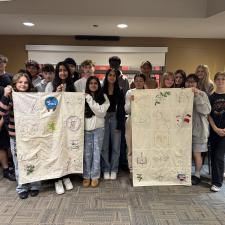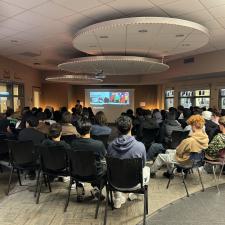Intellectual Development
Goals
- Improve student success in literacy.
- Improve student success in numeracy.
Focus on Literacy and Numeracy
Assessment Prep: In alignment with our district goals, the staff of Abby Senior have revamped our school wide approach to supporting, and preparing students for the grade 10 and 12 literacy assessments, and the grade 10 numeracy assessment. In addition to using sample and similar type questions in our everyday teaching, students are getting the opportunity to come together in the learning commons under our LC teacher for a walk through of the assessment. Included in the walk through are not only practice questions, but also online test features such as highlighting, vocabulary assistance, calculator features, split screen views and much more. Students have been engaged in each of the sessions and are now much more prepared for the assessment knowing what to expect, and how to use all of the assessment tools to support them in giving their best effort.
Results: In last year's Literacy 10 results, we saw a 5% increase in students who were scoring a 2 or a developing from the previous year. We also saw a 6% increase in students who were scoring a 2 or developing on the Literacy 12 assessment.
Literacy Instruction: We have spent some time rethinking how to best and intentionally support and teach literacy in all our classes. We have developed several language acquisition classes to support the learning of our English Language learners, and have committed to smaller class sizes, specific strategies, at level reading testing, progress monitoring, and an expansion of a variety of text similar to what students see on literacy assessments in all of our English classes grades 9 through 12. With an increase focus on strategies for reading, reading comprehension, and informational text students exposure to and confidence with informational and non-traditional text is helping students engage with text beyond a novel study or short story. As a result we are seeing a trend of increased confidence, expanded vocabularies, high levels of engagement, and a more intentional approach to literacy in our classrooms.
Numeracy Instruction: When talking about numeracy, we are specifically referring to student's abilities to use, interpret and communicate mathematical numbers to solve problems in everyday life. This year our Math department is focusing on building academic vocabulary of common terms across all grades, such as sum, product, quotient, efficiency, and other words like perimeter, distance, and speed. These terms come in several other subjects including science, PHE, and our applied skills classes. The idea is that students must first understand the language of math in order to understand what the problem they are solving.
These strategies and intentional teachings have made a significant difference for our English Language Learners as well. In Literacy 12, we saw a 20% increase in students who were scoring a 2 or a developing from the previous year, with similar results in Literacy 10, a 17% increase, and in Numeracy 10, a 12% increase.


